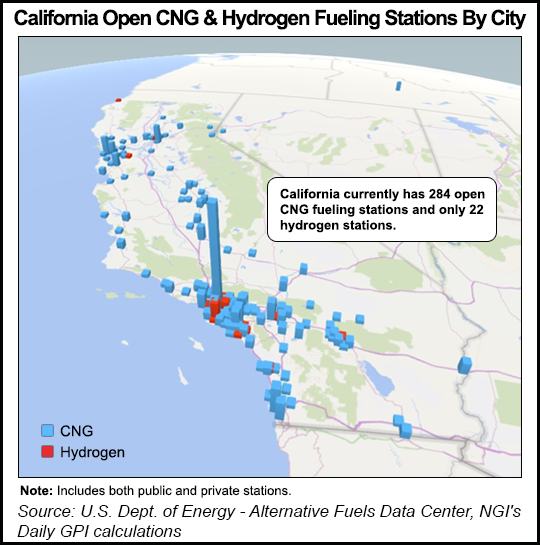Infrastructure | NGI All News Access
Alternative Transport Fuels Push For State Funding in California, Colorado
The gloves are off when it comes to competing for up to $200 million in California Air Resources Board (CARB) funding for clean transportation, and hydrogen advocates in the state are ready to go toe-to-toe with natural gas vehicle (NGV) backers and others in the alternative energy sector.

On Wednesday the California Hydrogen Business Council said it intends to make its case for fuel cell vehicles later this month when CARB holds a workshop on two of its alternative transportation fuel initiatives: the Air Quality Improvement Program (AQIP) and the Low Carbon Transportation Greenhouse Gas Reduction Fund (GGRF) for 2015-2016.
The council has set a deadline of Jan. 21 for getting input from its members interested in helping make a case for hydrogen at CARB’s Jan. 23 workshop in Sacramento.
“These are programs very relevant to council member interests and will direct the disbursement of approximately $200 million over a 12-month period,” said Jeff Serfass, managing director of the council. “It behooves us to make sure that allocations to hydrogen and fuel cell solutions are able to utilize as much of these funds as practical.”
In Colorado, NGVs were getting some acceleration from the state energy office’s latest release of a request for applications for the second round of funding in the alternative fueling stations (All Fuels Colorado) program. The multi-million-dollar effort is a joint program involving the energy office, Regional Air Quality Council and Colorado Department of Transportation (CDoT).
Under the program, launched last year, the state energy office is seeking proposals for building public access compressed natural gas (CNG) fueling centers with optional co-located electric vehicle (EV) chargers and propane autogas outlets along major transportation corridors (see Daily GPI, May 2, 2014).
A pre-bidding meeting is set for Thursday (Jan. 15), and the state will answer questions about the program through Jan. 22. Funding allocations will go exclusively toward the purchase of station equipment for developing CNG stations with up to $500,000, or 80% of the total equipment cost, for each station, the state energy office said.
State officials said they anticipate allocating up to $3 million in this next round of funding and up to $30 million in total through 2017.
Elsewhere in Colorado, ground was broken at year-end for a wastewater-based BioCNG fueling unit in Grand Junction, CO. BioCNG and partners will production biomethane from wastewater and in turn make it into CNG for use in public transportation.
BioCNG’s purification installation is at the Persigo wastewater treatment plant jointly owned by the city of Grand Junction and Mesa County. The feed gas is 60% methane. BioCNG engineered the system that will produce biomethane to support more than 30 vehicles, including city refuse trucks, dump trucks, pickup trucks, sedans and buses from the Grand Valley Transit.
BioCNG officials said it is the first project of its kind in the state and supports Grand Junction’s objective of creating a city fleet of CNG vehicles.
© 2024 Natural Gas Intelligence. All rights reserved.
ISSN © 1532-1231 | ISSN © 2577-9877 |
